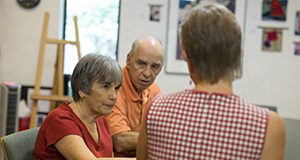 People are frequently at a loss for the best way to begin a discussion about end-of-life concerns with loved ones and health care providers and are also unsure of the topics they should cover. Nonetheless, conversations about end-of-life care and advance directives can help ensure that the person’s wishes are honored. These measures also eliminate much of the difficult decision-making that loved ones typically face at the time of their loved ones’ passing. This 5-page fact sheet, part of a new series entitled The Art of Goodbye, discusses the barriers to discussing the end of life and the process of communication with loved ones and health care providers. Written by Suzanna Smith, Lynda Spence, and Chelsea Tafelski, and published by the UF Department of Family, Youth and Community Sciences, October 2016.
People are frequently at a loss for the best way to begin a discussion about end-of-life concerns with loved ones and health care providers and are also unsure of the topics they should cover. Nonetheless, conversations about end-of-life care and advance directives can help ensure that the person’s wishes are honored. These measures also eliminate much of the difficult decision-making that loved ones typically face at the time of their loved ones’ passing. This 5-page fact sheet, part of a new series entitled The Art of Goodbye, discusses the barriers to discussing the end of life and the process of communication with loved ones and health care providers. Written by Suzanna Smith, Lynda Spence, and Chelsea Tafelski, and published by the UF Department of Family, Youth and Community Sciences, October 2016.
http://edis.ifas.ufl.edu/fy1470
Tag: Chelsea Tafelski
The Art of Goodbye: Exploring Self-Reflection
Many people assume that preparing for the end of life involves filling out forms at the doctor’s or lawyer’s office. Forms and checklists have their place and can be helpful, but they cannot address every issue because end-of-life concerns are complicated. Self-reflection is a helpful tool that begins to lay a foundation for planning while articulating people’s complex and unique emotions, values, priorities, fears, and preferences when it comes to facing their own mortality. This 4-page fact sheet is the second publication in a new series entitled The Art of Goodbye, and it covers resources that can help individuals explore their personal concerns and values before initiating end-of-life discussions with loved ones. Written by Lynda Spence and Chelsea Tafelski, and published by the UF Department of Family, Youth and Community Sciences, July 2016.
http://edis.ifas.ufl.edu/fy1465
